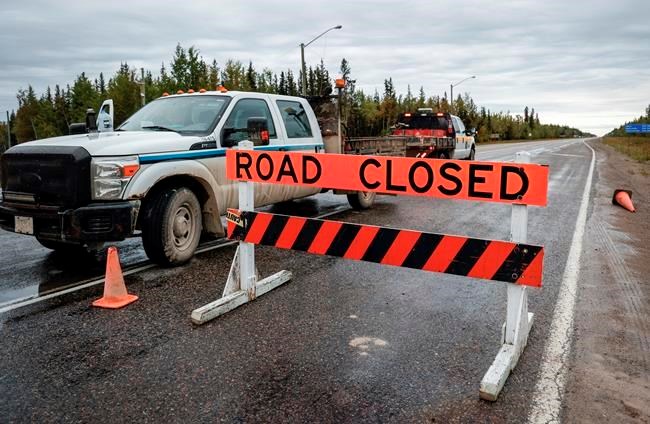EDMONTON — A state of emergency in the Northwest Territories has been extended until Sept. 11 and its premier says she understands the frustration of those forced from their homes.
"I want to go home, too. We all want to go home. It's hard being evacuated," Premier Caroline Cochrane said Wednesday following a visit to an Edmonton evacuation centre alongside federal ministers Randy Boissonnault and Dan Vandal, Alberta Forestry Minister Todd Loewen and Edmonton Mayor Amarjeet Sohi.
"We can't control fire. We can't control the wind and temperature, so we've got high temperatures still in the North," said Cochrane.
"What I'm telling people is as soon as it's safe to go home, as soon as the fire's in control, then it will take about four or five days at least."
The territorial government declared the state of emergency on Aug. 15 as wildfires threatened several communities, including the capital, Yellowknife.
The move was meant to allow the government to marshal the resources it needed to protect the health and safety of residents during an unprecedented wildfire season.
Officials said on Tuesday that essential workers were being recalled to Yellowknife to pave the way for the general population's return, but the repatriation was partially paused Wednesday due to a possible increase in fire risk associated with returning by road.
The territory said high winds are anticipated to accelerate fires along Highway 1 between Friday and Sunday, with the highway expected to close to all traffic during that time.
It said the repatriation of essential health staff will continue by air.
Officials said the fire outside Yellowknife continues to be held and that the fire risk to the city has decreased, but noted that it was still not safe for residents to return.
Nearly 70 per cent of the territory's population — including 20,000 Yellowknifers — are seeking refuge in Alberta and beyond until the danger has subsided.
Cochrane said her government has to make sure the power, the airports, the hospitals, grocery stores and gas stations are functioning and "then we will bring people home."
She confirmed police are still turning back residents attempting to return and that has to stop.
"We're all evacuated and people are tired. They want to be home, but it's really important that people not try to go home until they're called, until it's time, because not only do you put yourself at risk, you're actually putting our first responders at risk."
Fort Smith resident Michel Labine said through Facebook Messenger that he and his family are staying in Fort McMurray, Alta., trying to keep busy with card games and crafts while waiting to return home.
Labine, now an artist who holds the world record for creating the largest snowshoe, said he spent years as a renewable resource officer dealing with forest fires in the Northwest Territories.
He said wife is trying to help fellow evacuees by sewing bags from old clothes for when it's time to return home, but also that he’s aware that it might not happen soon.
“I know that there is a plan being worked out for our re-entry, but the weather forecasts are still predicting hot weather and high winds making these plans unavailable for implementation at this time," Labine said.
He said most evacuees in Fort McMurray continue to be worried for their homes and community, especially for fellow Fort Smith evacuees who wound up in different cities.
“Folks with addictions and others who rely on family, but are separated from them, are suffering,” he said.
Vandal, the federal northern affairs minister, said his government will continue to provide support as long as required. He also pointed to the co-operation of all levels of governments during this disaster.
"This is unprecedented. I think in times of need Canadians help one another and we were all together today. We've all been working together from the very beginning," he said.
Vandal said he's spoken to territory residents who have been away from home for the past two weeks who are in good spirits but are anxious to go home.
There are about 300 Canadian Armed Forces members helping with firefighting in the Northwest Territories. Military support is set to be provided until Sept. 5, with extensions possible pending further reassessment by Public Safety Canada, the Armed Forces and territorial authorities.
This report by The Canadian Press was first published Aug. 30, 2023.
The Canadian Press

